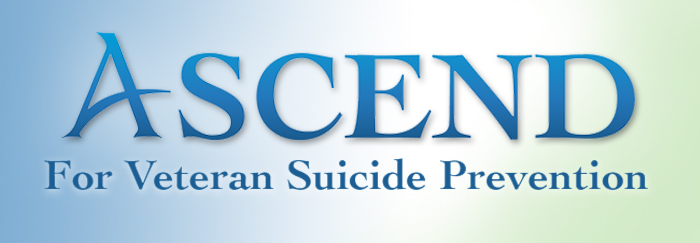ASCEND

If you are having difficulty playing the video above, visit the YouTube page.
ASCEND for Veteran Suicide Prevention
ASCEND - Assessing Social and Community Environments with National Data
One Veteran suicide is too many. We share a deep commitment to finding and addressing the factors that may lead a Veteran to take their life. Working together with Veterans and the VA, we can prevent suicide and bring back hope.
The Challenge
- The motivations and circumstances that lead to suicide are complex. To understand and prevent suicide, we need to understand the whole person and his or her environment. (More information below.)
- Some Veteran populations are more at risk for suicide and can be harder to reach in healthcare and research (for example, women, rural, and recently separated Veterans).
- Veterans live and work everywhere, and the majority receive care in their local communities rather than from the VA .
- Successful suicide prevention strategies require building strong partnerships between the VA and community organizations.
Multiple Levels of Risk and Protective Factors
Click on each item below to learn more.
ASCEND approaches suicide prevention from a social-ecological framework, which considers individual, relationship, community, and societal factors that place Veterans at risk for suicide or protect them from experiencing suicidal thoughts and behaviors. Click or tap on each level below to learn more about the factors that ASCEND examines at each level.
Sociodemographic characteristics, military service history and toxic exposures, mental and physical health conditions, trauma history, sources of stress, health care utilization, barriers and willingness to seek help, stigma, discrimination, lethal means access and attitudes, and history of suicidal thoughts and behaviors.
Social support and satisfaction, loneliness, relationships, and suicide loss.
Community connectedness and aspiration, social cohesion and trust, community stress and problems, neighborhood violence, and community stigma.
Will be assessed through publicly available data.
The Mission
To meet these challenges, the ASCEND team will reach out to Veterans across the country to learn more about how suicidal thoughts and behaviors are impacted by individual, relationship, community, and societal factors. ASCEND seeks to obtain input from all Veterans, regardless of whether they have experienced suicidal thoughts. We are especially interested in hearing from Veterans who have been underrepresented in prior suicide prevention research to ensure that their experiences are reflected in our results and recommendations.
We believe that, in partnership with the Veterans we serve, we can collect new, important information to help save Veteran lives. We highly value all Veterans’ perspectives, and sincerely hope that, if invited to do so, you will consider participating in this nationwide study, and that you will share information about ASCEND with other Veterans.
Together, we can prevent Veteran suicide!
To learn more about the study team, our Veteran partners, our commitment to Veteran privacy and data security, and about how to participate, please click on the navigation tabs above.
COMIRB # 20-0719 / PI: Hoffmire
Last Updated 16 December 2024



















